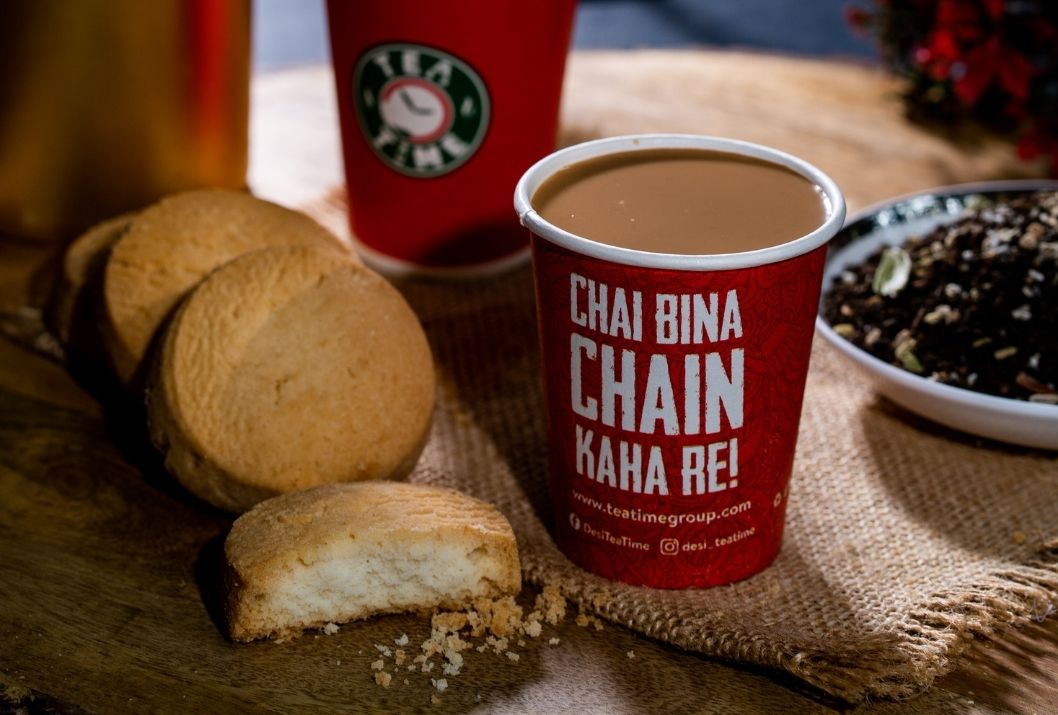- 11 January 2024
- No Comment
- 2417
How a 10 Rupees Tea Cup Dominated Coffee Culture

In an era dominated by coffee culture and its attached routines, the ascent of Tea Time is no cakewalk. The brand’s impressive turnover and widespread presence reflect the determination and vision that fueled its growth.
But the question remains, how did a simple tea shop turn into India’s largest tea chain?
The answer lies in the intriguing journeys of passion, risk, and innovation. Hi, I’m Nabeel Shaikh, a seasoned chartered accountant and entrepreneur.
This is the story of an engineer who left his ideal job and luxurious life in Dubai to start his own business just at the age of 29.
Uday Srinivas Tangella, whose courage and determination defied the conventional career trajectory. Having graduated in electronics and communications engineering from TRR Engineering College, Hyderabad, India, in 2006, Uday ventured into the software industry, weaving his way through different companies.
His story takes a bold turn when, after enjoying a luxurious life and driving a Jaguar in Dubai, Uday decided to bid farewell to the corporate world at the age of 29 and set his sights on an unconventional path, opening a humble Tea Shop.
Facing skepticism from his family, who deemed his career move as misguided, Uday found solace and support in his wife, Bakul Tangella, an ayurvedic doctor. Together, they stood against the tide, ready to turn Uday’s unconventional vision into reality.
In 2016, armed with Rs 5 lakh, Uday laid the foundation for his dream in a mere 150 sq ft space in Rajahmundry, a small city in Andhra Pradesh.
Tea Time, Uday’s brainchild, wasn’t just a tea shop, it was a canvas for a revolutionary idea in the making.
One Year, 100 Outlets, and a Rs 2 Crore INR Turnover
Within the first year of operation, Tea Time spread its aroma far and wide, reaching a remarkable milestone of 100 outlets and a turnover of Rs 2 crore. Uday’s determination and strategic approach were already setting the stage for something extraordinary.
3,000 Outlets and Rs 35 Crore INR Turnover
In a mere six years, Uday’s entrepreneurial journey has not only been a personal success but a catalyst for nearly 3,000 small business owners, and around 3,800 Tea Time outlets across India in 20 States.
The turnover of Desi Tea Time Pvt. Ltd now stands at an impressive Rs 35 crore (INR), a testament to Uday’s vision and Tea Time’s flourishing presence.
So, how did Uday manage to transform the local chai stand into India’s largest tea chain?
The secret lies in his astute move to turn the beloved chai into a franchise business.
Except for the first outlet, all Tea Time branches are thriving franchises, a testament to the viability of Uday’s unconventional business model and its successful journey from one small tea shop to a nationwide tea chain.
This journey involved several crucial steps.
Firstly, Uday recognized a fundamental aspect of India, undeniably, a tea-drinking nation. Tea is not merely a beverage; it’s ingrained in their daily routines, more of a habit than a fleeting event.
Secondly, Uday acknowledged a reality often overlooked, most habitual tea drinkers lack the disposable income to splurge on an expensive cup of tea or coffee.
Thus, he set out to bridge the gap, aiming to deliver a cup of tea in a clean environment at a reasonable price.
The third step involved standardizing the taste across all Tea Time outlets. What makes Tea Time truly special lies in its ability to fill a void in the market.
While franchising is not a new concept, it has primarily been associated with high investments, especially in the coffee sector.
Tea Time changed the game by bringing the franchise model to small towns and villages, not just big cities.
Market Niche
Tea Time strategically chose to focus on the majority of the country, the middle and lower-middle-class population. This untapped segment became their primary market.
By offering a variety of beverages at an affordable price range starting as low as 10 Rupees, Tea Time managed to cater to the masses.
Eliminating Unnecessary Costs
Tea Time disrupts the traditional high-end tea and coffee outlets by cutting down on unnecessary costs.
While a visit to a premium outlet includes not only the beverage cost but also overheads like rent, electricity, interiors, salaries, and branding, Tea Time minimizes these expenses to keep prices low.
Consistency as the Cornerstone
Another aspect that sets Tea Time apart is its commitment to consistency. Through standardized procedures, training programs, and supplying their own tea powder, Tea Time ensures a uniform taste and quality across all outlets.
This dedication to consistency, combined with an affordable price point, emerges as their unique selling proposition (USB).
In Uday’s words, the success of Tea Time is not just a sip; it’s a monthly celebration of Rs 25 crore. If we extend the calculations, this equates to a staggering Rs 300 crore annually.
What began as a humble tea shop has blossomed into a financial juggernaut, rewriting the norms of the tea industry.
From Three to Forty-Five: Nurturing Growth
Since its inception with just three individuals, Tea Time has evolved into a robust business ecosystem with 45 dedicated employees.
This dynamic team oversees the management of franchises, orchestrates the intricate dance of sourcing and supplying raw materials to diverse outlets, and navigates the realms of marketing, research, and development.
Uday’s vision extends beyond the thriving outlets to a 25,000-square-foot office nestled in the heart of Banjara Hills, Hyderabad.
Three Hands and Ten Flavors: The Tea Time Experience
At Tea Time, the equation is simple yet impactful, an average of three diligent employees orchestrating a symphony of flavor. Within the walls of each outlet, patrons are presented with a tantalizing array of 10 distinct teas, each catering to diverse preferences and priced to cater to every budget.
Tea Time’s journey through taste begins with the humble Dum Tea, a delightful introduction priced at a pocket-friendly Rs 10. This blend encapsulates the essence of simplicity, offering an affordable yet satisfying start to the tea aficionado’s journey.
Stepping up the flavor spectrum, Tea Time introduces Ginger Tea, a spirited infusion available at Rs 15. This zesty creation not only tantalizes taste buds but also caters to those seeking a bold and invigorating tea experience.
For the health-conscious sipper, the Green Tea takes center stage, beckoning at Rs 25. With its refreshing and revitalizing properties, this offering adds a touch of wellness to the Tea Time repertoire, proving that indulgence and health can seamlessly coexist.
In the world of Tea Time, affordability intertwines with elegance, creating a diverse menu that beckons tea enthusiasts from all walks of life.
Tea Time ventures beyond the traditional, offering not just a diverse range of teas but also a gastronomic haven. Soft drinks, milkshakes, and the savory delights of samosas and biscuits find a home alongside the steaming cups of perfection in every outlet.
The Farm-to-Glass Experience
A unique USP of Tea Time lies in its commitment to quality, encapsulated in the ‘farm to glass’ experience. Sourcing tea leaves directly from Assam’s verdant farms, Tea Time ensures a swift journey from procurement to the outlets within a month.
This dedication to freshness sets Tea Time apart from its competitors.
The Franchise Magic
From Rs 5 Lakh to Rs 4.25 Lakh: The Gateway to Entrepreneurship
Uday’s chosen path for rapid expansion is the franchise model, proving to be the secret sauce in Tea Time’s growth. The franchise fee, a modest Rs 4.25 lakh, opens the door to entrepreneurship.
In return, Uday provides a comprehensive start-up kit, equipping each outlet with movable essentials like refrigerators, deep freezers, stoves, utensils, and an initial stock to kickstart their business.
A Slice of the Sales Pie
Beyond the franchise fee, the company takes a 5% share of the sales from each outlet. This collaborative approach aligns the success of the company with that of its individual franchise owners.
Training for Taste and Success
Uday’s commitment to consistency extends to employee training. Through meticulous training programs, Tea Time ensures that the taste remains a constant across all outlets, maintaining the brand’s reputation for excellence.
Growing Together
Uday’s philosophy behind embracing the franchise model is clear, he doesn’t want to grow alone. The franchise model, with an average payback period of five to ten months, not only fuels Tea Time’s expansion but also serves as a catalyst for the growth of aspiring entrepreneurs.
As Uday puts it, “I don’t want to grow myself only. I want others to grow as well.” This ethos of shared success echoes through the vibrant journey of Tea Time.
The Digital Buzz: A Million Searches Monthly
In the digital realm, Tea Time has become a household name. Uday proudly claims that approximately one million searches for ‘Tea Time near me’ are conducted on the internet every month, a testament to the brand’s widespread popularity and the resonance it holds with tea enthusiasts across the nation.
Brewing Sustainability: Beyond the Cup
Tea Time isn’t just about serving a perfect cup; it’s about embracing responsibility. The brand takes conscious steps towards environmental sustainability by utilizing biodegradable cups at all its outlets.
Uday’s vision extends beyond profit margins; he envisions a brand with zero waste and zero carbon footprint.
In this mission for sustainability, Uday’s partner is not just a business ally but a life partner, his wife. Together, they work towards making Tea Time a zero-waste and zero-carbon footprint brand.
Tea Time’s story is not just about the tea they serve; it’s a narrative of accessibility, diversity, and a mindful approach to environmental stewardship. As the brand continues to brew success, it also stands as a beacon for aspiring entrepreneurs and environmentally conscious consumers alike.
Navigating Challenges and Unveiling Opportunities: Tea Time’s Franchise Dynamics
Tea Time’s success story faces its share of challenges, with expansion and replicating the model nationwide topping the list. Additionally, the competitive landscape introduces the challenge of surpassing other players offering franchise units at a lower fee.
Despite these obstacles, the company’s Head Start and unwavering commitment to consistency and quality present a formidable defense.
Expansion and Model Replication
Expansion on a nationwide scale brings its unique set of challenges, especially when replicating a successful model across diverse regions. However, Tea Time seems well-equipped to tackle this hurdle, given its early advantage and commitment to maintaining a uniform standard.
Competitive Landscape
Facing competitors offering similar franchise units at a lower cost is an industry-wide challenge. Yet, Tea Time’s solid foundation and dedication to quality give it a competitive edge, making these challenges seem surmountable.
Success Beyond Control
Tea Time offers a low-cost business opportunity, catering to those with a lower-risk appetite or limited investment availability. The success of each franchise depends on the owners’ ability to grow their businesses independently.
Some have added unique elements, like samosa stalls or transformed their spaces into engaging zones with board games and snacks to keep customers coming back.
Tea Time emerges not just as a brand but as a profitable business, outshining its competitors. The franchise model proves to be more than a simple investment; it’s a platform for entrepreneurs to mold and grow as they see fit.
The Journey Ahead
As we conclude our exploration of Tea Time’s startup story, it’s evident that this venture is more than just a tea chain, it’s a low-risk, high-reward opportunity for budding entrepreneurs.
The future lies in the hands of the franchise owners, each with the potential to shape Tea Time into a thriving business.
Valuable Lessons for Entrepreneurs from Tea Time’s Success Story
Tea Time’s journey is not just a success story but a guide for aspiring entrepreneurs seeking innovation, consistency, and responsible business practices.
- Follow your passion, and don’t be afraid to take unconventional paths. Uday’s switch from a corporate job to opening a tea shop at 29 shows that passion fuels success.
- Believe in your vision, even when faced with skepticism. Uday’s family doubted his move, but his determination and support from his wife proved crucial.
- Recognize fundamental aspects of your market. Uday identified India’s love for tea and the affordability factor for the majority, tailoring his business model accordingly.
- Innovate business models. Uday transformed the chai stand into a franchise business, making it accessible to small towns and villages, disrupting the traditional high-end model.
- Provide affordable options without compromising quality. Tea Time’s success lies in offering standardized taste at reasonable prices, catering to the middle and lower-middle-class population.
- Cut down on unnecessary expenses. Tea Time disrupted the market by minimizing overheads and offering quality tea at a fraction of the cost compared to premium outlets.
- Consistency is key. Tea Time’s commitment to maintaining a uniform taste and quality across all outlets became their unique selling proposition.
- Collaborate for mutual success. Tea Time’s franchise model involves a modest fee, shared sales revenue, and extensive training, fostering shared growth for the company and individual entrepreneurs.
- Embrace continuous evolution. As Tea Time evolves, the story serves as a reminder that businesses should be adaptable and open to change for sustained success.
As you sip your favorite cup, remember that every business story, like Tea Time, is crafted from determination, innovation, and a touch of human connection.
So, whether you’re an aspiring entrepreneur or simply a tea enthusiast, let the warmth of these lessons steep into your endeavors, making each day a celebration of resilience and shared success.


